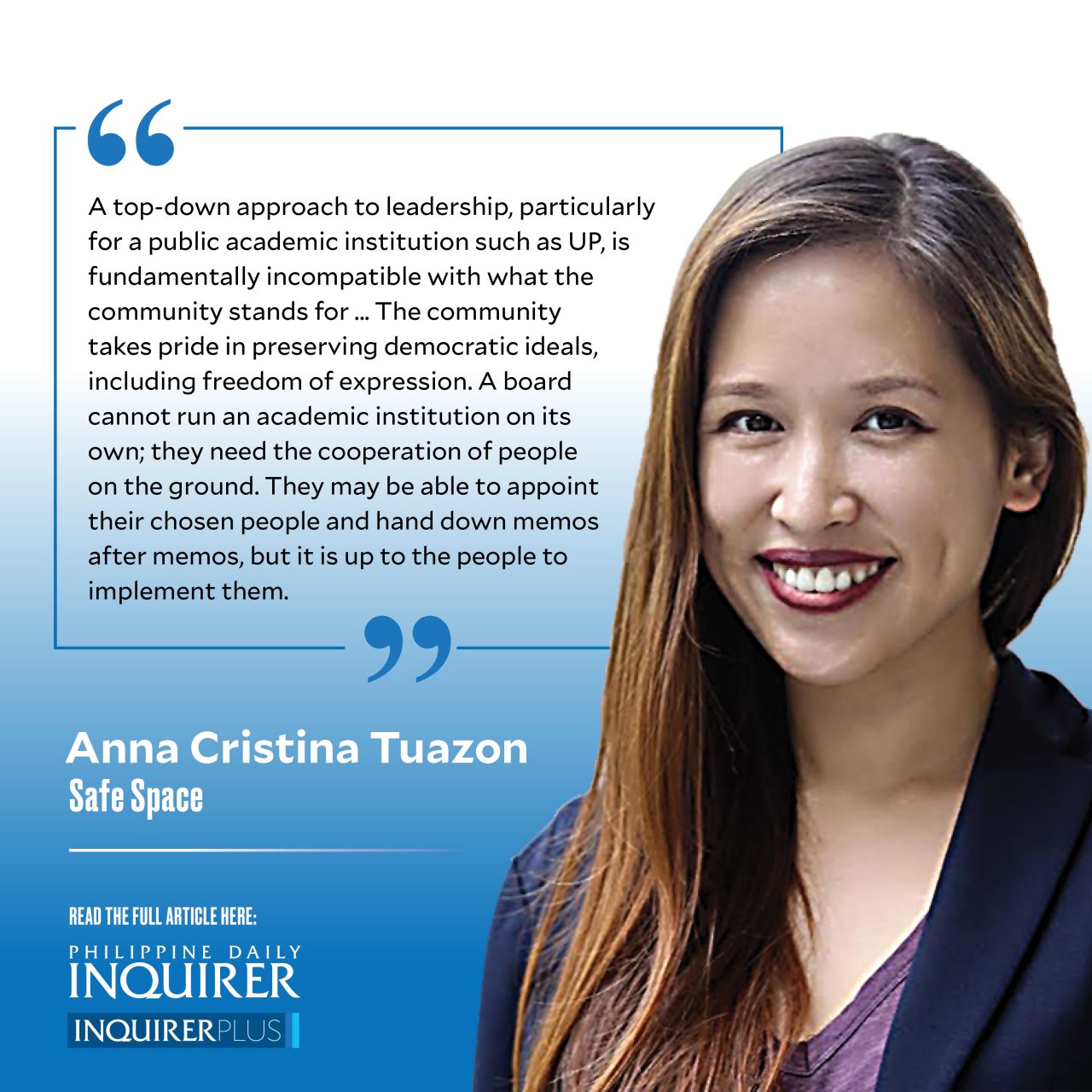UP Diliman’s top-down leadership
 There was chaos in University of the Philippines (UP) Diliman’s Quezon Hall last Monday as the UP Board of Regents (BOR)—the school’s highest decision-making body—elected UP College of Law dean Edgardo Vistan II as the newest UP Diliman chancellor, beating incumbent chancellor Fidel Nemenzo. Nemenzo was strongly supported by UP Diliman’s students, faculty, and staff who gathered that day to ensure that their voices were heard despite the closed-door deliberations. As the BOR refused to heed the students’ demands for an explanation, students vented their frustration toward the physical door that has shut them out. This heated moment comes at the tail-end of a series of monumental decisions by the BOR in the past year that went against the sectors’ sentiments.
There was chaos in University of the Philippines (UP) Diliman’s Quezon Hall last Monday as the UP Board of Regents (BOR)—the school’s highest decision-making body—elected UP College of Law dean Edgardo Vistan II as the newest UP Diliman chancellor, beating incumbent chancellor Fidel Nemenzo. Nemenzo was strongly supported by UP Diliman’s students, faculty, and staff who gathered that day to ensure that their voices were heard despite the closed-door deliberations. As the BOR refused to heed the students’ demands for an explanation, students vented their frustration toward the physical door that has shut them out. This heated moment comes at the tail-end of a series of monumental decisions by the BOR in the past year that went against the sectors’ sentiments.
Outside observers may take a look at the passionate, sometimes chaotic expressions of UP Diliman students, faculty, and staff and merely dismiss them as disrespectful behavior (or worse, to Red-tag them). Democracy and self-determination are values held strongly and deeply in a community who has long experienced top-down decisions that have not served them well. Genuine democracy requires allowing opposition to have a place in the arena of decision-making. Merely following top-down orders is not democracy. We cannot even elect our own leader, the minimum for democracy. To ridicule their outrage and protests is akin to ridiculing citizens who protest against their authoritarian regimes.
I get confused by this seemingly populist stereotype that UP is antigovernment when its very leadership is pretty much determined by the sitting administration. The irony of the perceived animosity between government and UP is that the board of regents practically represents the administration, save for four seats representing different sectors of the UP community. The other eight seats are occupied by the Commission on Higher Education chairperson, the UP president (appointed by the BOR), a Senate representative, a Congress representative, a secretary of the board (appointed by the BOR), and three direct appointees by the President of the Philippines. It only takes six votes within the board to get appointed. This means that sector votes can be bypassed completely.
The BOR has not been afraid to go against the will of the community. In the past, they have handed down decisions regarding academic dishonesty that actually went against the recommendation of the faculty body, a blatant disregard for academic freedom. They have appointed their preferred deans counter to the recommendations of the search committees formed by the colleges. The BOR is also not beholden to explain their decisions, turning the Quezon Hall board room into a mystical realm of elders. They have demonstrated time and time again that they do not care to maintain trust within the community and that its leadership is pure top-down.
A top-down approach to leadership, particularly for a public academic institution such as UP, is fundamentally incompatible with what the community stands for. This is not a private institution owned by a single entity and as such should not be privy to the whims of lords. Each student, faculty, and staff are passionate stakeholders and are strongly invested in ensuring a thriving community that serves its people. The community takes pride in preserving democratic ideals, including freedom of expression. A board cannot run an academic institution on its own; they need the cooperation of people on the ground. They may be able to appoint their chosen people and hand down memos after memos, but it is up to the people to implement them. We have seen academic leaders who have failed to earn the respect of their students, faculty, and staff: They become lame ducks.
Incoming Chancellor Vistan has a huge gap to reconcile. He has been appointed by the UP Board of Regents. He was not appointed by the people. To be a genuine leader of this headstrong multicultural community of fierce independent thinkers, he needs to realize sooner rather than later that his power will not come from the BOR but through the trust he will earn from the people he will serve. He needs to show that as much as he has benefited from being favored by political appointees, he can use his new position of power mindful of his great responsibility to the community.
——————–
aatuazon@up.edu.ph




















